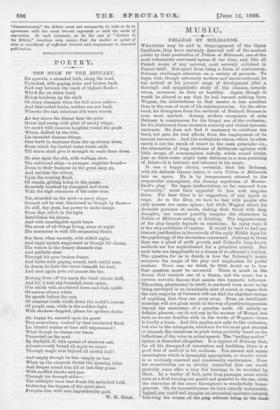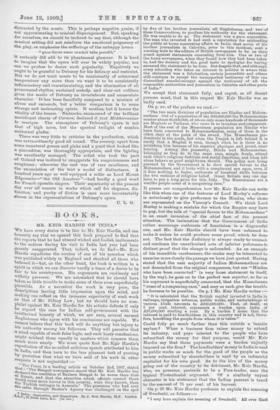MUSIC.
PELLEAS ET REPLISANDE.
WHATEVER may be said in disparagement of the Opera Syndicate, they have certainly deserved well of the musical public by their production of Pelleas et Melisande, one of the most vehemently canvassed operas of our time, and, like all French music of any account, most severely criticised in France itself. But apart from being a focus of controversy, Debussy challenges attention on a variety of grounds. To begin with, though extremely modern and unconventional, he has arrived at his present stage of development after a thorough and sympathetic study of the classics, towards whom, moreover, he feels no hostility. Again, though it would be absurd to say that he had learned nothing from Wagner, his indebtedness to that master is less manifest than in the case of most of his contemporaries. On the other hand, his divergence from the methods of Richard Strauss is even more marked. Ameng modern composers of note Debussy is conspicuous for his frugal use of the orchestra, for his abstinence from excessive sonority and violent dynamic contrasts. He does not find it necessary to reinforce the band, but gets his best effects from the employment of its normal resources. And the undeniable charm whieh be often exerts is not the result of resort to the oasis principle—i.e., the alternation of long stretches of deliberate ugliness with little scraps of commonplace melody, which sound lovely, just as ditch-water might taste delicious to a man perishing of thirst—it is intrinsic and inherent in his music.
It was a happy choice, certainly, that led Debussy, with his delicate bizarre talent, to turn Pell6as et 3felisande into an opera. He is by temperament attuned to the crepuscular atmosphere, the dreamy mysticism of Maeter- linck's play. Its vague mediaevalism, so far removed from "actuality," must have appealed to him with singular force. For here there is no suggestion of any epoch or reign. As in the Bing, we have to deal with people who only possess one name apiece ; but while Wagner shows his dramatis personae at meals, slaking their thirst with deep draughts, one cannot possibly imagine the characters in Pelleas et Melisande eating or drinking. The impressiveness of the play largely depends on omissions. In many ways it is the very antithesis of realism. It would be hard to find any historic justification in the records of the early Middle Ages for the psychology of the characters concerned. Jealousy in those days was a plant of swift growth, and Golaud's long-drawn methods are too sophisticated for a primitive society. But such tests are inapplicable to a drama of so ethereal a texture. The question for us to decide is how far Debussy's music enhances the magic of the play and emphasises its poetic content. There can, we think, be little doubt as to how that question must be answered. There is much in the drama that reminds one of a dream, and the music has a curious narcotic flavour that assists this hypnotic influence. The action, phantasmal in itself, is rendered even more so by being enveloped in an impalpable mist of sound, so vague that the vast majority of listeners will not find the slightest vestige of anything that they can carry away. Even an intelligent musician will not glean much in the way of positive impression beyond the recurrence of a peculiar scale. Of melody or definite phrases—we do not say in the manner of Mozart, but such as we are familiar with in the works of Wagner—there is hardly a trace. And this applies not only to the orchestra, but also to the voice parts, which are for the most part chanted or intoned, the variations in pitch being probably based on the inflections of the voice in actual speech. The "leading motive" system is discarded altogether. It is typical of Debussy that, for all his disregard of convention and tradition, there is a good deal of method in his madness. You cannot call music meaningless which is invariably appropriate, or chaotic which is so curiously reserved and consistently unobtrusive. Even his eccentricities are so strictly controlled that one would probably cease after a very few hearings to be troubled by them. As a matter of fact, quite long passages occur which even at a first bearing are genial and grateful to the ear, while the character of the score throughout is wonderfully homo- geneous. On its unassertiveness we have already commented. Indeed, one could well imagine an unmusical spectator intently. following the course of the spiv without being -in the least
'distracted by the music. This is perhaps negative praise, if not approximating to musical disparagement. But, speaking for ourselves, we should be inclined to say that, although the musical setting did not reinforce the emotional poignancy of the play, or emphasise the sufferings of the unhappy lovers "quos durus saner orudeli tabe peredit," it certainly did add to its phantasmal glamour. It is bard to imagine that the opera will ever be widely popular, nor an we profess to desire such popularity. Negatively we Ought to be grateful to Debussy for his delicacy and restraint. But we do not want music to be consistently of subnormal temperature any more than we want it to be consistently inflammatory and overstimulating, and the elimination of all Pronounced rhythm, sustained melody, and clear-cut outlines gives the music of Debussy an invertebrate and emasculate oharacter. It has been fancifully compared to a mixture of Olives and caramels, but a better comparison is to some strange and insinuating opiate. It soothes, but it lowers the 'vitality of the hearer, Nietzsche, enamoured of the brilliant meridional charm of Carmen, declared it fent Moditerraniser la musique. The atmosphere of Debussy's opera is not that of high noon, but the spectral twilight of sombre autumnal glades.
There was very little to criticise in the production, which
was extraordinarily good all round. The scenery, apart from -some unnatural greens and pinks and a pond that looked like .a pincushion, was thoroughly appropriate, and the lighting was excellently managed. The artist who took the pert -of Goland was inclined to exaggerate his suspiciousness and roughness ; otherwise the cast was of rare excellence, and -the enunciation of the text a. model of distinctness. A.
hundred years ago so well equipped a critic as Lord Mount Edgcurnhe—" the Old Amateur "—had hardly a good word for French operatic singers. Their superiority at the present 'day over all corners in works which call for elegance, dis- tinction, and purity of diction is once more incontestably .111rown in the representations of Debussy's opera.
C. L. G.











































 Previous page
Previous page